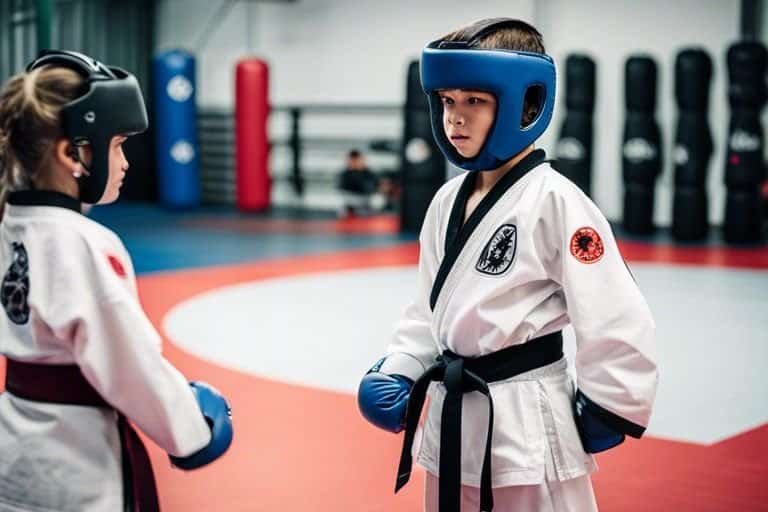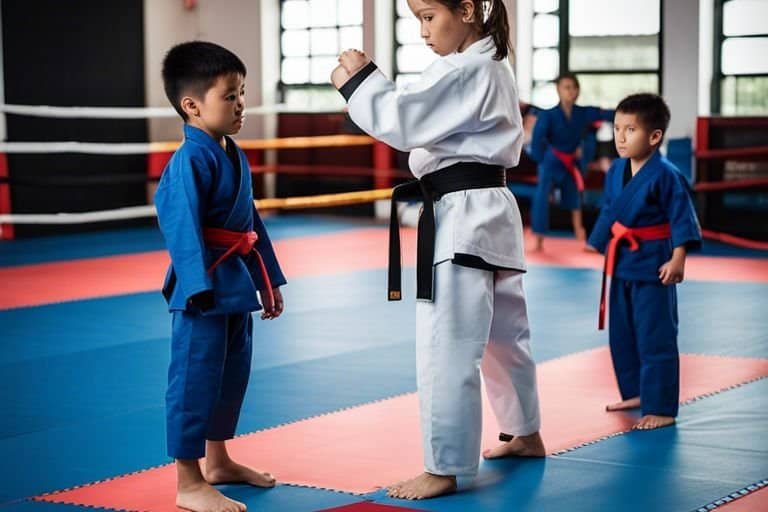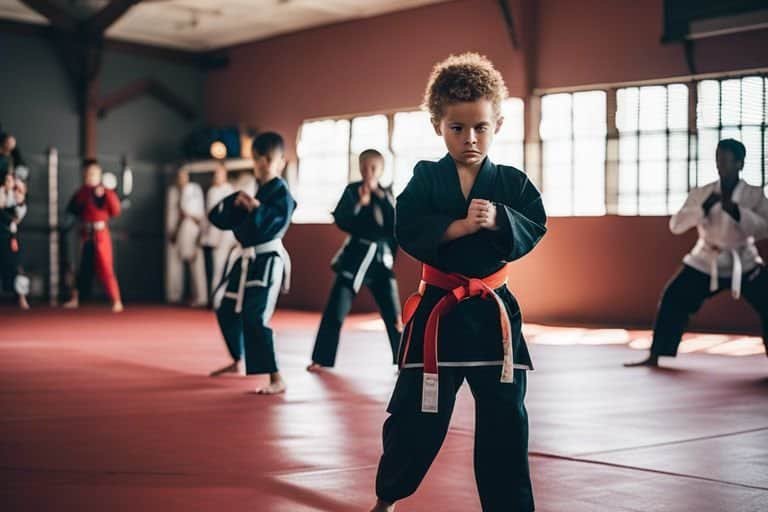Engaging children in MMA training has proven to be an effective way to instill discipline and respect in the next generation. Contrary to popular belief, MMA for kids is not just about teaching them fighting techniques, but also about imparting valuable life skills that will benefit them both inside and outside the training facility. Through MMA, children learn to respect their opponents, follow instructions from their coaches, and develop the self-discipline necessary to succeed in all areas of life. This martial art also equips them with the ability to defend themselves in potentially dangerous situations, ultimately increasing their confidence and well-being. With the right guidance and supervision, MMA can be a powerful tool for shaping the character of our future leaders.
Key Takeaways:
- Discipline: MMA provides a structured environment that helps kids develop discipline through regular training, learning specific techniques, and following rules during sparring and competitions.
- Respect: Martial arts instills respect for instructors, training partners, and the sport itself, teaching children the value of respect for others and the importance of sportsmanship.
- Confidence: Through mastering techniques and overcoming challenges, kids in MMA gain confidence in their abilities, which translates into improved self-esteem and resilience in other aspects of their lives.
Understanding MMA
Even though mixed martial arts (MMA) has gained popularity in recent years, many people still have misconceptions about what it involves. In this chapter, we will take a closer look at the history of MMA and the core disciplines that make up this unique and challenging sport.
Brief History of Mixed Martial Arts
Briefly, mixed martial arts as we know it today, originated from ancient Greece, where it was part of the Olympic Games. However, it wasn’t until the early 20th century that modern MMA began to take shape, with the introduction of various combat sports such as Brazilian Jiu-Jitsu, Muay Thai, and wrestling. In the 1990s, the Ultimate Fighting Championship (UFC) brought MMA into the mainstream, breaking down barriers and showcasing the effectiveness of different martial arts styles in combat.
The Core Disciplines of MMA
Martial arts are the foundational disciplines that form the core of MMA. These include Brazilian Jiu-Jitsu, Muay Thai, boxing, wrestling, and judo. Each discipline brings its own unique set of techniques and strategies, allowing fighters to develop a well-rounded skill set that covers both striking and grappling. The integration of these diverse martial arts has not only made MMA one of the most exciting and unpredictable sports but has also led to the evolution of new fighting styles and techniques.
To truly excel in MMA, young practitioners must develop a deep understanding of each core discipline. This involves mastering the techniques of Brazilian Jiu-Jitsu, honing striking skills in Muay Thai and boxing, and learning takedown and ground control techniques in wrestling and judo. By embracing the challenges of these disciplines, young athletes can build a solid foundation for their MMA journey, equipping them with valuable self-defense skills, physical fitness, mental toughness, and important values such as discipline and respect.
Benefits of MMA for Kids
One of the most effective ways to instill discipline and respect in the next generation is through the practice of Mixed Martial Arts (MMA) for kids. MMA offers a multitude of physical and psychological benefits that can have a profound impact on a child’s overall well-being.
Physical Health and Fitness
The physical demands of MMA training provide an excellent outlet for children to improve their overall health and fitness. The rigorous training regimen involved in MMA helps children develop strength, agility, and endurance, while also enhancing their balance and coordination. Additionally, the cardiovascular benefits of MMA training can help children maintain a healthy weight and reduce the risk of developing obesity and related health issues.
Psychological Benefits: Discipline, Respect, and Self-Confidence
Physical training in MMA is accompanied by mental conditioning that fosters essential life skills such as discipline, respect, and self-confidence in children. Through structured training and adherence to rules and protocols, children learn the value of discipline and the importance of respecting their coaches and peers. This fosters a sense of responsibility and accountability, while also boosting their self-confidence as they overcome challenges and obstacles in their training.
Benefits of MMA extend beyond physical fitness to instill values such as discipline, respect, and self-confidence in children, shaping them into well-rounded individuals with a strong sense of integrity and pereseverance.
Starting with MMA: A Guide for Parents and Kids
For children who have expressed an interest in mixed martial arts (MMA), starting their journey in this discipline can be an exciting and rewarding experience. However, it is important for parents to approach this decision with caution and ensure that they make informed choices when it comes to selecting the right gym and coach for their child. Here are some important considerations to keep in mind when starting your child’s MMA journey.
Choosing the Right Gym and Coach
On your search for the right gym and coach, it is essential to prioritize reputation and professionalism. Look for a gym with a good track record of working with children and a coach who has experience in teaching and mentoring young students. Visiting the gym in person can provide valuable insights into the environment and culture, as well as the opportunity to observe how the coach interacts with the students. Additionally, inquire about the safety protocols and the coach’s approach to teaching discipline and respect alongside the physical training.
Safety Measures and Preventing Injuries
Starting with the basics of MMA, it is crucial to emphasize the importance of proper warm-up and cool-down techniques to prevent injuries. Correct technique for each move should be emphasized and practiced under supervision. It’s important to ensure that the gym has the appropriate safety equipment and first-aid measures in place. Right guidance and focus on safety first is paramount in a child’s MMA training to ensure a positive and fulfilling experience.
Right guidance and focus on safety first should be the priority in a child’s MMA training to ensure a positive and fulfilling experience. Maintaining a balance between pushing boundaries and ensuring safety is critical in fostering a healthy learning environment for young practitioners of MMA.
Setting Goals and Monitoring Progress
To foster a sense of achievement and discipline in young MMA practitioners, setting both short-term and long-term goals can be highly beneficial. This can be anything from learning a new technique to aiming for a certain belt ranking. Consistent monitoring and feedback from the coach can help the child track their progress and stay motivated on their MMA journey.
It is important to strike a balance between setting challenging yet attainable goals for the child, and providing the necessary support and guidance to help them stay focused and committed to their training regimen. It’s crucial to recognize and celebrate the small victories along the way, and to use any setbacks as learning opportunities for growth.

MMA and Its Impact on Child Development
Unlike traditional team sports, MMA offers a unique combination of physical and mental development for children. Through rigorous training and discipline, MMA instills important values in young practitioners, shaping their character and preparing them for the challenges of life.
Academic Performance and Social Skills
Impact of MMA on child development goes beyond physical aspects. Studies have shown that children who practice martial arts tend to perform better academically and develop stronger social skills. The discipline required to excel in MMA transfers to the classroom, leading to improved focus, time management, and goal-setting abilities. Moreover, the respectful and supportive environment of MMA gyms fosters positive social interactions, teaching children the value of teamwork and empathy.
Long-Term Benefits of Starting Early
Starting MMA training at a young age can have significant long-term benefits for children. In addition to improved physical fitness and self-defense skills, early exposure to MMA instills confidence, self-discipline, and a strong work ethic. These qualities can have a profound impact on a child’s future, shaping their mindset and approach to challenges well into adulthood.
Any parent looking to set their child up for long-term success should consider the advantages of introducing them to MMA at an early age. The valuable lessons and skills acquired through consistent practice and training can be instrumental in shaping a child’s future endeavors, both personally and professionally.

Final Words
Summing up, it is clear that MMA for kids is a powerful tool for instilling discipline and respect in the next generation. Through structured training and mentorship, children can learn the values of perseverance, self-control, and respect for themselves and others. These attributes are not only beneficial in martial arts but also in everyday life, helping children to become better individuals and contributing members of society. It is important for parents and educators to recognize the positive impact that MMA can have on a child’s development and to support them in their pursuit of martial arts training.
FAQ
Q: Why is MMA beneficial for kids?
A: MMA teaches discipline, respect, and self-defense skills while promoting physical fitness and mental resilience.
Q: At what age can kids start learning MMA?
A: Kids as young as 4 or 5 years old can start learning basic MMA movements and techniques in a safe and controlled environment.
Q: How does MMA instill discipline in kids?
A: MMA training emphasizes the importance of regular practice, following instructions, and maintaining a positive attitude, which instills discipline in kids.
Q: What role does respect play in MMA for kids?
A: Respect for coaches, peers, and the sport itself is a fundamental aspect of MMA training for kids, teaching them important values both on and off the mat.
Q: Are MMA classes safe for kids?
A: When taught by experienced instructors in a controlled environment, MMA classes for kids are safe and can actually reduce the risk of injury by teaching proper technique and respect for others.



